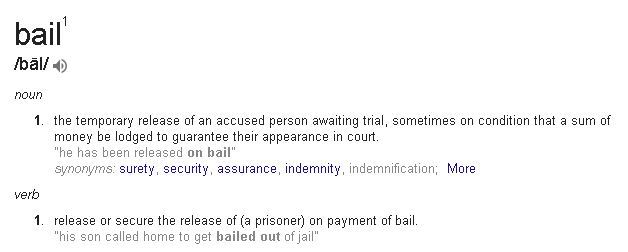Posting Bond – Bail – Can I Help My Friend Get Out of Jail?
- What is Pre-Trial Release?
- How Is Bond Set?
- What is the Difference Between Bail and Bond?
- Who Decides Bonds?
- When is Bond Set?
- Can I Visit Someone in Jail?
- Can I Post a Bond?
- What Does a Bail Bondsman Do?
- What is a Promise to Appear?
- Who is the Magistrate?
Navigating the legal system can be a bit confusing for friends and family of someone arrested. We’re here to help – Bill Powers
What is Bail? What is a Bond? What is Pre-Trial Release?
Getting a late-night call from a loved-one in jail can be a traumatic experience.
It’s not unusual for parents, friends, and family members to have a lot of questions. How Does It Work? What Will Happen? What is the Worst Case Scenario? What is the Best Case Scenario? Can They Get Out? What Will It Cost? How Long Will It Take? Can I Go See Them? Can I Talk to the Magistrate or Police Officer?
Attorneys regularly help explain the process and options to friends and family. In fact, that is one of the more important aspects of being a lawyer.
We want to help people. We understand an arrest can throw you for a loop, especially if you have no experience with the legal system or criminal courts.
And because of that, often times the first people we talk to are loved-ones and not the accused.
We offer a free consultation, which means we (Powers Law Firm PA lawyers) don’t charge for our time on an hourly basis for criminal defense cases. In the event someone wants to retain our services, then we begin discussing fees and payment options.
The first step normally involves gathering information, explaining the process, and giving advice on what to do next.
Thereafter it may make sense to retain legal counsel. Prior to providing any advice or guidance, we like to get a snapshot of what has happened.
Lawyers may ask questions like:
- What are the Charges?
- Where are the Charges (County / City / Town)
- Has S/he Been Arrested?
- Where Are They (the accused) Now?
- Has a Bond Been Set?
- Have They Given a Statement?
- When Did Things Take Place?
Bonding someone out can take time. If you have questions, please give us a ring. We’ll explain the process – Bill Powers
Here are a few things to consider:
- Generally speaking, it can take a while for someone to be “processed”
- North Carolina has specific rules and regulations regarding:
- Conditions of Release
- Procedures to Speak with Friends and Family while in Custody
- In North Carolina, the County Sheriff is commonly responsible for Jail
- Jail is normally reserved for people charged with an offense or awaiting trial**
- Prison is normally reserved for people convicted of offenses
- **There are times when someone may be sentenced to a term of imprisonment at a Jail facility
- Bail Bondsman and Bonding Companies may be an option, but are not always necessary or required
See More: How Is Court Scheduled in North Carolina?
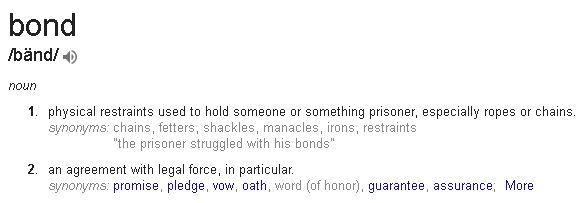
What’s the Process:
While it can vary from jurisdiction to jurisdiction, there are general aspects of many criminal cases involving the manner in which someone is arrested, “booked,” and processed. There are also at times differences in the method of arrest and processing, depending on the type of offense or charge, the location of the accused, and the manner in which accusations have been brought. If you have specific questions about the status of a loved-one whom may have been arrested or is in jail, please speak with an attorney experienced handling criminal matters in North Carolina. At Powers Law Firm PA, the consultation is both free of charge and confidential.
We are here to help. 704-342-HELP
- Arrest – Without Warrant
- On-Scene Identification – Computer Database Inquiry, Questioning, and Investigation
- NCIC National Crime Information Center – National FBI Maintained Database Criminal History
- DCI North Carolina Department of Public Safety / State Bureau of Investigation / Division of Criminal Information
- On-Scene Identification – Computer Database Inquiry, Questioning, and Investigation
- Transport to LEC Law Enforcement Center
- Questioning Interrogation
- Testing
- Line-Up Identification
- Seizure and Storage of Evidence
- Preparation of Notes, Documentation, and Charging Materials
- Transport to Jail Facility
- Fingerprinting
- Photograph
- Seizure of Personal Items
- Transfer to Magistrate’s Department
- Testimony or Affidavit of Charging Officer
- Testimony of Civilian Witness(es)
- Review of NCIC
- Review of DCI
- Setting Terms and Conditions of Release
- Transfer back to Sheriff’s Department / Local Detention Facility
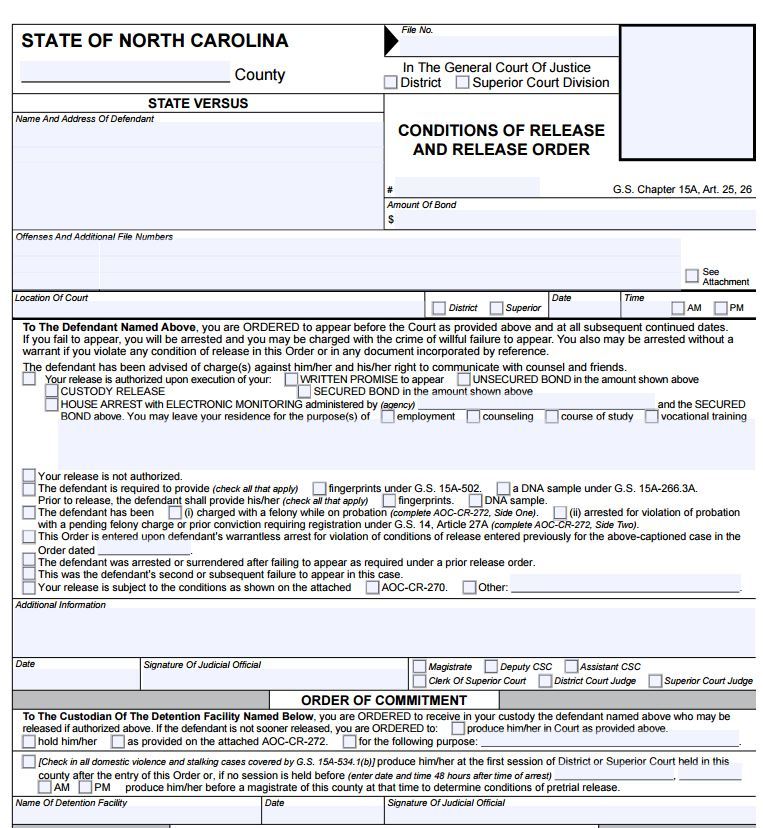
Sample Form: north carolina conditions of release order 2016
See More: Bail, Bonds and Custody NC
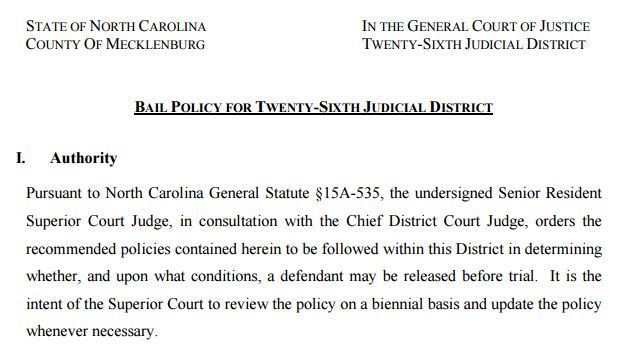
Mecklenburg County Bail Release Policy 2010
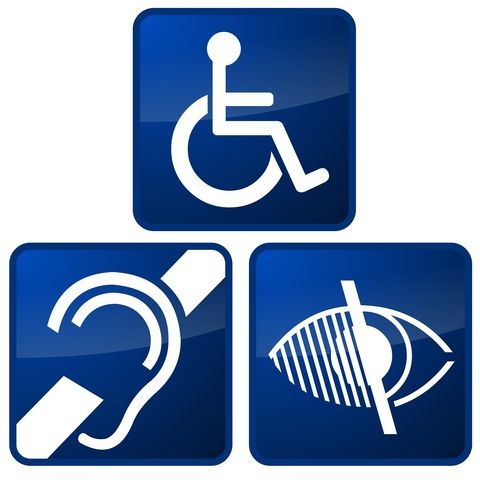
Modified Transcript of “Can I Help a Friend in Jail” for the Hearing Impaired
Hi, I’m Bill Powers. I’m going through a series of these general questions that sometimes people share online. They are not to anyone who is a client of ours necessarily, but just people asking questions about how the system works.
This one appears to be posted by a friend, the big title is, “How can I get a defendant pre-trial release?”
The friend’s court was on a certain date, it wasn’t on the docket. He or she probably has been in custody for quite a while and they don’t have another court date for what would be perceived as a protracted period of time.
Those are good questions.
Often times these inquiries involve a series of different legal issues. One of the key words that was asked about, and that’s ‘pre-trial release’. A pre-trial confinement normally relates to someone that’s been picked up on a criminal charge. They could have a bond set, it could a small amount of money, it could be a large amount of money, several thousand dollars.
The question is, “Are they available for pre-trial release?”
Generally speaking there are 2 main categories we’re looking at.
- The first is, is the person a danger to himself or others if they’re released?
- Second is, are they going to come back to court or are they going to pull a rabbit (or run), meaning they’re going to skip town or not come to court?
A magistrate could set a bond, if you’re arrested for something as simple as a DWI, or maybe a judge has set the bond and there’s been a couple court dates or some process that’s developed over time.
It’s important to realize that there are multiple different steps here and a lot depends on the type of charge, the severity of the charge. With regard to the more minor charges, misdemeanor charges, bonds often times are set according to a schedule or a series of conditions or local policies by a particular county.
They’re not set in stone, they’re merely suggestions.
In North Carolina, there are additional considerations for DWI Driving While Impaired cases regarding the terms and conditions of release.
Now with superior court cases, we tend to see the more serious felonies having hire bond amounts, because then there’s this issue regarding the severity, the type of offense.
Murder, manslaughter, robbery, some of the more serious felony cases can have more serious bonds.
You may have an initial bond hearing in a district court, the case could get indicted and then it’s in superior court and then you’re looking at handling the bond issue on a case that has serious repercussions long term.
It’s complicated.
First question we like to ask is what type of charge, or what type of charges are there? When did the person get placed into custody? Where are they? What’s the status of the bond? We can often times go online and figure out what the amounts of bonds are, the terms and conditions, and then start working our way through it.
It’s time consuming, it takes careful consideration of the factual basis behind the case, and also the background of the particular person. If you have questions, if you want to know more information about these things, give us a ring. We offer free confidential consultation, it’s not unusual for family members or friends to call. We can provide you information. Look forward to hearing from you.
 Carolina Criminal Defense & DUI Lawyer Updates
Carolina Criminal Defense & DUI Lawyer Updates